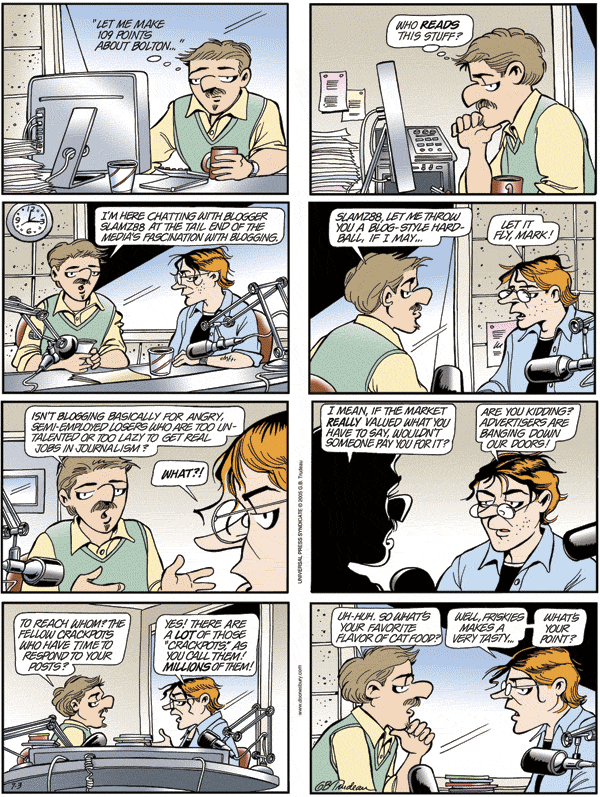By JEFFREY SIMPSON
Friday, May 27, 2005 Page A19
John Weston, federal Conservative candidate in West Vancouver-Sunshine Coast, has a bone to pick.
A recent column described his law firm as a "Christian law firm." It ascribed that description to the firm's website. These were wrong assertions. The firm's website makes no such reference.
Apology offered. The confusion arose, in the haste of writing, from articles that Mr. Weston had written that were posted on the Christian Legal Fellowship website -- articles he has since asked to be withdrawn from the site.
In one, Mr. Weston described the process of forming a "Christian law firm," including avoiding the use of the term in marketing in case "the label 'Christian' might backfire by embarrassing the Kingdom of God . . . and drive away clients who might be turned off or mystified by the spiritual connection."
His firm, Mr. Weston explains in an article, is distinguished from "other great firms where I have worked" by the "regularity and informality of prayer practised by the partners." Would everyone feel comfortable working in such surroundings? Mr. Weston says "we brought in the Christian head of a Christian development organization [who] suggested that hiring interviews could include allusion to the practices of professionals at the workplace such as prayer."
How Mr. Weston practises law is his own business and that of his partners. He's a Harvard graduate, after all. But he is a Conservative Party candidate, and his public religiosity illustrates a trend that is popping up elsewhere in Canada -- candidates from, or associated with, Christian faith movements or churches are winning more Conservative nominations than ever.
The result must be to give these religious conservatives at least greater influence in a party that already has several handfuls of such men and women in the parliamentary caucus. Their candidacies pose a difficult political challenge for Stephen Harper, who must give some solace to these conservatives on a few issues without appearing to be beholden to them.
Little could be more politically lethal for the party's chances of forming a national government than the perception that religious conservatives have disproportionate influence. But this sort of candidate has won nominations or is already a Conservative MP, so they cannot be utterly ignored.
Four such candidates, including Mr. Weston, recently won nominations in British Columbia's Lower Mainland. In Nova Scotia, three candidates with Christian affiliations have been nominated. And some are showing up as nomination winners in Ontario. The new candidates are interesting because they are not from traditional bedrock conservative rural areas, but from urban centres.
David Sweet, for example, is back as Conservative candidate in the Hamilton-area riding of Ancaster-Dundas-Flamborough-Westdale. He won a sharply contested nomination there before the last election; this time, it was by acclamation. When he sought the nomination the first time, his website underscored his six-year presidency of the Canadian chapter of Promise Keepers. This time, his website says only that he headed a "national non-profit organization." Promise Keepers, a huge and growing movement in the United States, describes its vision "to challenge Canadian men to discover the incredible life quest that God has for them as revealed by Christ and the Holy Scriptures."
In Ajax-Pickering, Rondo Thomas just won a contested nomination for the Conservatives. He's an official with the Canada Christian College.
In Nova Scotia, the three nominated candidates with published Christian links -- including Paul Francis, a minister in Lower Sackville -- insisted that the links had nothing to do with their nominations.
Maybe, but at a rally three weeks ago organized by the Annapolis Valley Fellowship, the roughly 700 attendees were encouraged to back the three in their nomination fights. According to a report in the Halifax Chronicle-Herald, an information sheet circulated at the meeting stated: "We need strong Christian, pro-family people to become members of Parliament from our area to represent us in Ottawa."
The specific issue that animates these candidates and other social conservatives is gay marriage and, more broadly, what they see as an assault on the traditional family. They are furiously opposed to same-sex marriage on moral, religious and family grounds. Ultimately, they will discover that the only legal way to reverse gay marriage is using the notwithstanding clause in the Constitution. Mr. Harper must know this perfectly well, but he won't risk saying so.
In the last election, a handful of social conservative MPs blurted out comments that the Liberals seized on with telling effect. This time, Mr. Harper will have more of these candidates to worry about.
jsimpson@globeandmail.ca










